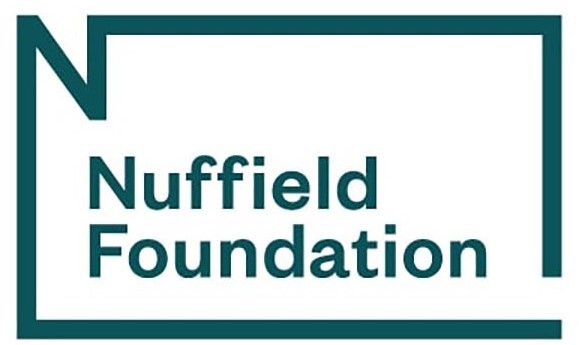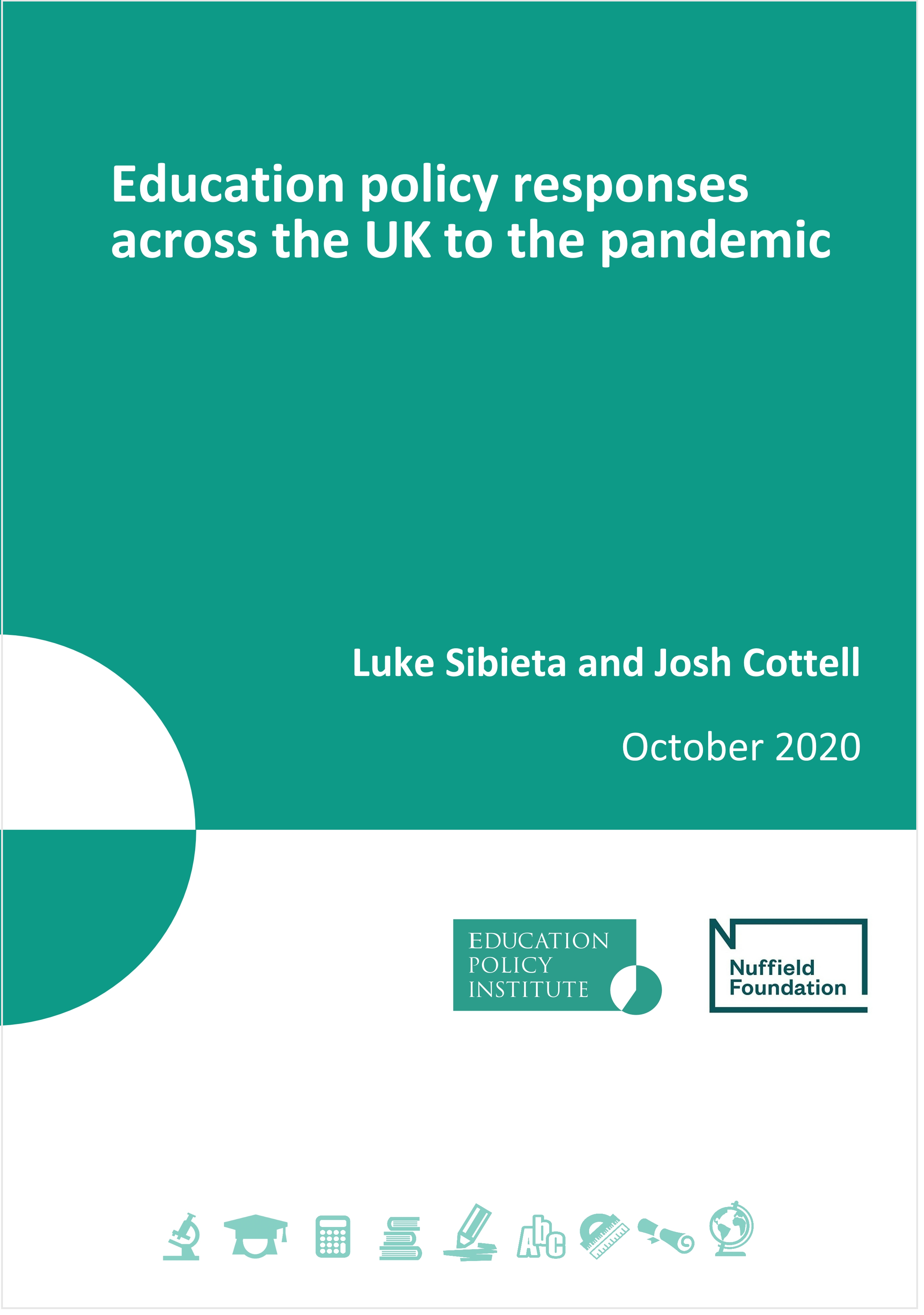A new report by the Education Policy Institute (EPI), funded by the Nuffield Foundation, examines the education policy responses of England, Scotland, Wales and Northern Ireland during the height of the pandemic.
Education policy responses across the UK to the pandemic is the first detailed analysis comparing how the governments of each of the UK nations supported pupils’ education during the period of closures to schools this year.
The study considers how all four nations approached school closures, the delivery of free school meals, the provision of digital learning at home, and support for the most disadvantaged and vulnerable children.
The report provides new insights into the role of devolution in the UK and the impact of the divergent policy paths pursued by the four nations. It also provides important lessons for UK policymakers on how they can learn from both the mistakes and successes during the lockdown this year, as they continue to respond to the pandemic.
You can download the full report here.
Key findings
School closures: how did the UK nations compare?
More than double the proportion of schools were open in England than in Scotland, Wales or Northern Ireland over the lockdown period, allowing more pupils in England to attend:
- During the height of the pandemic, England led the way in keeping the most schools open for vulnerable children and those of ‘key workers’: 71% of its schools were open, compared to 34% in Wales, 30% in Northern Ireland and just 24% in Scotland.
- This allowed more pupils in England to attend schools: 6.7% of vulnerable pupils attended during lockdown, compared to 4.8% in Scotland, 4% in Wales and just 1.5% in Northern Ireland. This enabled more pupils in England to continue learning and more key workers to access childcare. However, it will have also led to fewer children and staff in the other nations mixing during the peak of the pandemic.
- The higher proportion of schools open in England was driven by schools mostly operating individually. In contrast, schools in Scotland, Wales and Northern Ireland largely operated as ‘hubs’ or ‘clusters’, whereby one school in a group of schools would stay open, allowing the others to use its premises.
- The UK nations issued different messages to families on schools: for example, the Northern Ireland Executive stated that the attendance of vulnerable children and those of key workers should be a “last resort”. This looks to have affected attendance.
- There were substantial differences in lost learning time across the four UK nations as a result of school closures, largely because of different school holiday and term dates. Up to 14 weeks of learning was lost for pupils in England, up to 13 weeks were lost in Wales, up to 12 weeks were lost in Northern Ireland and up to 11 weeks were lost in Scotland.
How did approaches to free school meals differ?
1.7 million pupils in the UK receive free school meals, and this number is likely to rise. During lockdown, there were vastly different approaches supporting the families that use them:
- England’s policy of a national voucher scheme was beset by design and implementation flaws, meaning many disadvantaged families faced long delays in accessing financial support.
- In contrast, Wales, Scotland and Northern Ireland were largely successful in ensuring that families had access to timely and appropriate support. Scottish and Welsh responses proved more effective as they were delivered through local authorities, used existing infrastructure and were flexible according to families’ needs. In Northern Ireland, simple direct payments were used, also granting flexibility to families.
- On extending support to those who receive free school meals into the summer, Wales was the only country to give certainty to families by announcing the policy very early on, in April. Scotland, England and Northern Ireland, on the other hand, performed policy U-turns in mid-June, following significant campaign pressure. These delays in extending support will have likely hindered families’ ability to plan their finances ahead of the summer holidays.
Supporting online learning at home: how did the UK nations compare?
Research shows that the amount of learning taking place at home during the lockdown period varied greatly among regions across all four UK countries.
- Hours of home-schooling were highest in London, the South East and South West of England, with around a quarter of pupils learning for over 4 hours per day.
- Home learning hours were lowest in Wales, Scotland, the Midlands and Northern England, where just 15% or less learned for 4 or more hours per day. In Northern Ireland, 18% pupils learned for more than 4 hours a day.
- There is strong evidence that disadvantaged pupils received the least amount of home-learning: differences in home-learning between high- and low- income families equated to about 75 minutes per day.
All UK nations made significant efforts to provide digital devices to pupils from poorer backgrounds. However, there were stark differences in the speed of delivery.
- Wales’ response to addressing the lack of access to online learning was commendable. The Welsh Government was able to draw on well-established infrastructure, allowing them to act quickly following the closures. Policymakers and schools were able to re-purpose existing stocks of laptops and send internet routers to disadvantaged learners by the end of May.
- The delivery of laptops and internet routers came later in England, as new procurement systems were needed. The majority of equipment was delivered by the end of June.
- In Scotland and Northern Ireland, the response was far slower. Laptop and internet delivery in these countries was not even complete by the end of the school year, leaving poorer pupils to wait several months to access online learning materials.
Differences in support for children with special educational needs and disabilities (SEND)
Support for pupils with SEND was insufficient across all UK nations, with specialised educational provision required by these pupils often lacking:
- During the lockdown period, England, Scotland and Northern Ireland all weakened the legal duties of local authorities and other bodies to provide for pupils with SEND; this could result in severe consequences for the education and development of these pupils. Wales did not alter these legal duties, but it not yet known how this actually affected levels of provision.
- England has gone the furthest in financially supporting the needs of children with SEND, allocating an additional £10 million to the Family Fund, on top of its planned £27m allocation. In specific response to the pandemic, the one-off catch-up premium is also set at a higher rate of £240 per pupil in special schools (as opposed to £80 for other pupils).
- However, overall, all UK nations have failed to adequately support children with SEND during the lockdown period, with provision and support patchy and highly dependent on a pupil’s local authority.
Support for early years education across UK nations
Early years and childcare providers, who rely on a mix of private and public funding, have been under significant pressure across the UK:
- Early years settings often operate on tight margins, and many were highly dependent on the UK-wide furlough scheme, while others received funding for government-funded childcare through separate schemes in all four nations.
- However, government guidance on access to this assistance was unclear and at times contradictory, leading to costly delays across all nations. The UK government failed to clarify whether the furlough scheme and government-funded childcare support would both be available for providers to cover their losses. A three-week delay in clarifying this caused great financial uncertainty for providers.
- Continued government-funded childcare support was the most generous in England and Scotland. However, funding rates will have differed considerably among individual providers. Other support included sector-specific grants in Wales, Scotland and Northern Ireland, and business grants in England and Northern Ireland.
Education policy responses across the UK to the pandemic can be read in full here.
This report is funded by the Nuffield Foundation. The Nuffield Foundation is an independent charitable trust with a mission to advance social wellbeing. It funds research that informs social policy, primarily in Education, Welfare, and Justice. It also funds student programmes that provide opportunities for young people to develop skills in quantitative and scientific methods. The Nuffield Foundation is the founder and co-funder of the Nuffield Council on Bioethics and the Ada Lovelace Institute. The Foundation has funded this project, but the views expressed are those of the authors and not necessarily the Foundation.

Visit www.nuffieldfoundation.org



